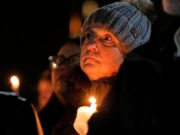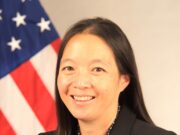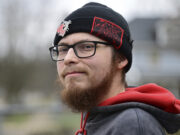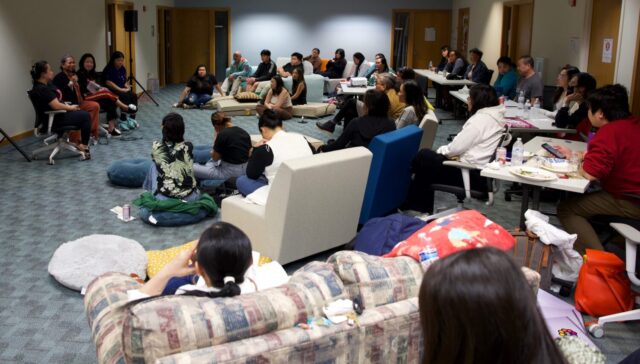Freedom Inc. hosted the kickoff event of the “Taking Root”/SEARR Tour on April 11, screening the four-part docuseries “Taking Root,” produced by VietLead and its co-executive director, Lan Dinh. Viet Lead is a grassroots community organization in Philadelphia and South Jersey that strives for community self-determination, social justice, and cultural resilience. This was the first of many screenings that will take place worldwide throughout 2024.
Directed by Oanh Nhi-Nguyen, “Taking Root” documents the failed resettlement of Hmong, Cambodian, Vietnamese, and Lao refugees to Philadelphia, Pa. as a result of US intervention in Southeast Asia, and the process’ intergenerational impact. An estimated two million people fled the region as refugees in the 1980s, with over 500,000 losing their lives in the process. Those who made it to the US were described in the docuseries as “exit[ing] one battlefield and enter[ing] another.”
Freedom Inc. is a Madison-based grassroots organization that works towards gender justice, queer justice, and Black and Southeast Asian liberation. The event was hosted in partnership with the Southeast Asian Freedom Network (SEAFN), a national collective of grassroots organizations mobilizing Southeast Asian communities towards abolition, and the driving force behind the SEARR campaign.
The SEARR campaign demands “concrete relief” for Southeast Asian communities who have suffered displacement and generational trauma as a result of US intervention. The campaign aims to achieve its goals — which include four different legislative bills — by 2025, which marks 50 years since the end of US wars in Southeast Asia.
The warm gathering opened up with a community meal of Hmong food and opportunities for guests to take Polaroid pictures with friends. The local Freedom Inc. team was joined by grassroots organizers hailing from New York City, Boston, Providence, and Philadelphia.
Before the screenings began, Pheng Thao, SEAFN’s Director of Capacity Building, led the group through breathing exercises, emphasizing the need for viewers to take care of themselves throughout the screening. “So many of the times, what happens when we see really traumatic things, we may not be experiencing it directly, but indirectly it’s been passed down from generation to generation,” he explained. “So your body keeps it.”
The first episode focused on the general resettlement of refugees to Philadelphia in the 1980s without the government providing the adequate resources for them to thrive. Children of refugees talked about their experiences living in severely neglected buildings, trying to translate for their parents, and memories of their parents picking up underpaid and illegal work on farms outside of Philadelphia and South Jersey.
The second episode focused on the interpersonal racial violence that many refugees experience as a result of structural violence. Policy changes made by both the Clinton and Reagan administrations to decrease welfare programs—changes which were rooted in anti-Blackness—severely impacted Southeast Asian communities that depended on those government supports. In addition to this, school-aged refugees were also being bullied and beaten up in school by their peers, a violence that created a pipeline to incarceration and involvement in gangs.
The last screening of the evening was “Deportation From A Mother’s Perspective,” produced by Freedom Inc. In it, Freedom Inc.’s own members painfully recount the fact of their children’s final deportation orders as a result of anti-Black policies. Through tears, these mothers emphasized that their sons’ deportations would be unfair, especially since they had already served their time in prison.
The evening culminated in a panel discussion facilitated by Freedom Inc. co-executive director Chai Moua featuring SEAFN executive director Chhaya Chhoum, Freedom Inc. Queer Justice director Zon Moua, and Community Power Builders (CPB) organizer Ma Yang.
Even though the documentary took place in Philadelphia, Yang and Moua drew many connections between the experiences described in the film and the struggles that Hmong communities have faced historically and in the present day in Wisconsin. 
“When we talk about this landscape of Philly being heavily Black, in Madison and northern Wisconsin, it’s not like that,” Moua explained. “So the violence that you’re actually experiencing on the daily is from white folks. […] And it’s very obvious, it’s in your face.”
She continued: “Folks that have lived in Wisconsin for a long time know that, ‘Hey, you just cannot go to certain places. If you drive into Minnesota or anywhere, you don’t make any stops because it’s just not safe.’ It is literally life or death.”
Yang also recalled being pulled out of class for “extra help” as a kid, a strategy that in retrospect, she realized did more harm than good. “It was pulling us away from our actual learning and focusing on these minor details that didn’t really need to be focused on,” she said.
Chhoum then spoke more on the SEARR campaign and its long-term goals. For her, the movement has two guiding questions: “What does our community look like in the next 50 years? […] What does it look like for us to thrive in the United States?” Secondly, echoing the central message of “Taking Root,” she asked, “If we could do resettlement again, how will we do it for our people?”
The multi-year campaign has been “20 years in the making,” and was sparked by the first wave of deportations in Cambodian communities in the US. As stated on the campaign’s website, SEARR’s legislative priorities include “a demand for the US to take responsibility for the destabilization of Cambodia, Laos, and Vietnam due to its military intervention during the war” and a “call for immediate relief for [their] people who have been targeted for detentions and deportations since the early 2000s.”
“Not only do we want to end Southeast Asian deportation, we also want liberation in our lifetime,” Chhoum said. “We also want racial justice. We also want abolition, [and we] also want to end prison systems and structures that keep our community from thriving.”
As SEARR builds momentum towards these national goals, Moua emphasized the importance of getting involved on a local level. Freedom Inc. is presently working on a number of abolition and racial justice initiatives, including its Invest/Divest campaign, which includes their work around No Copy City Fitchburg, No New Jails, and Police Free Schools.
“We’ve really looked at the multiple ways of understanding that, for us to also be able to fight deportation, we actually need to stop the police,” she said. “We need to stop the jails. We need to stop this continuous occupying force here. We have the police here, and then we have the militaries over there. They’re all the same, right? And so we must actively be organizing around that.”


































